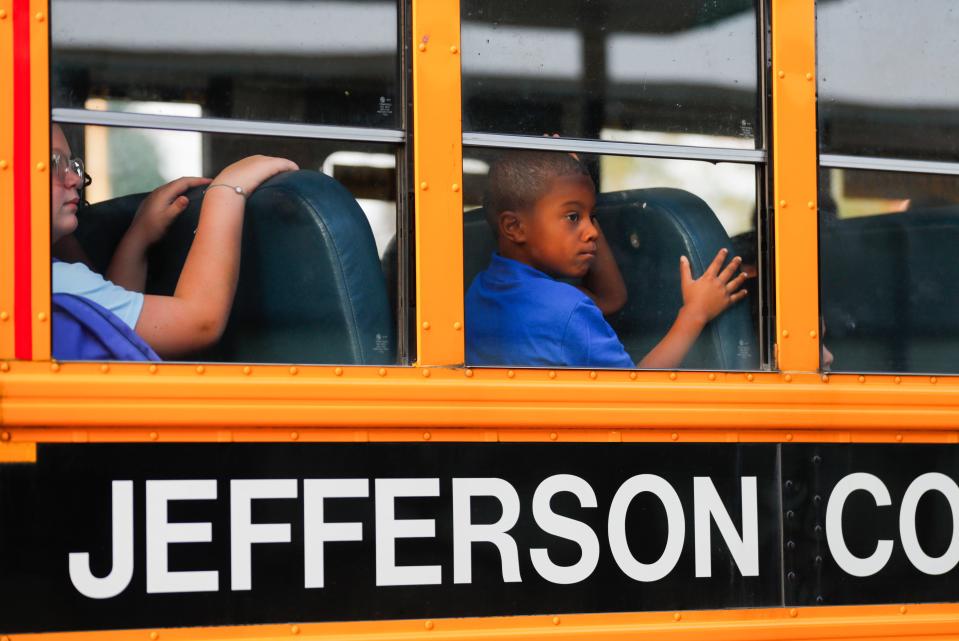JCPS used a Boston firm to overhaul its busing system. What we know about AlphaRoute
Last year's busing system caused significant challenges for schools, families and students across the Jefferson County Public Schools system. It's the reason Superintendent Marty Pollio cited for altering school start times, bus routes and stops going into this school year.
Those changes were done through a $265,000 contract with the Boston firm, AlphaRoute. The company's plan, which relied on artificial intelligence, cut the number of bus stops by nearly half, allowing the district — for the first time — to employ more drivers than routes.
While delays were expected on the first day of school — as is the case each year for JCPS — the "transportation disaster" that caused panic among families whose children arrived home late into the night, was not.
The district has largely remained mum about what caused the epic failure − whether the routes are inefficient, drivers were still unfamiliar with their new routes or the problems were something different altogether.
The leader of AlphaRoute, which has ties to Massachusettes Institute of Technology, also could not pinpoint what went wrong, according to a statement provided Thursday morning to The Courier Journal.
"We know JCPS is working diligently to resolve the issues it experienced yesterday, and at this time it's not yet clear what the root causes were for those issues," said John Hanlon, CEO and co-founder of AlphaRoute. "But we recognize that the situation was extremely regrettable and likely caused by the significant changes to bus routing which were made necessary by the district's severe driver shortage."
The district's new student assignment plan could have also contributed to the chaos, Hanlon said, calling it all a "substantial amount of change," for JCPS to undergo at once. The assignment plan ended the district's practice of forced busing − largely of students living in western Louisville across the county.
"We are fully confident that the new bell times and the new routes will work as planned, and we will do everything we can to support the district during this process," Hanlon said.
While AlphaRoute has undergone scrutiny related to its recent work with Ohio's largest district and 2017 work some of its top employees were involved with for the Boston Public Schools district, Hanlon said those situations were not comparable to those at JCPS.
Columbus City Schools in Ohio signed a three-year contract with AlphaRoute last year, paying $1.5 million for a new software system meant to "more efficiently and effectively develop bus routes — but instead has apparently contributed to major problems for hundreds of students and their parents," a Columbus Dispatch article states.
As a result, the district backtracked and began using its previous software while running AlphaRoute's "in the background."
“This has not been right from the get-go,” Rodney Stufflebean, an official with Columbus' transportation department, said last fall. “We basically put all of our eggs in one basket with Alpha. We know that was probably not the best decision.”
In March, when speaking to The Courier Journal, Stufflebean didn't cast sole blame on AlphaRoute for its transportation woes, but rather the national driver shortage − the primary reason JCPS was also led to the engineering firm.

"Our primary challenge was the national shortage of bus drivers, which forced us to put more students on fewer buses," Stufflebean said. "While AlphaRoute helped us create routes, we didn’t have enough drivers to cover all of the routes, and we didn’t know enough about the system to be able to make changes or updates on the fly."
At the time, he said the transition back to the previous system was rooted in the fact that drivers were more familiar with it but his team was continuing to "learn more about the AlphaRoute platform and how it works for our specific needs."
This school year, the district will continue to use its previous software system, with AlphaRoute in the background, according to a statement from the district provided to a Columbus Dispatch reporter Wednesday.
How Columbus has used AlphaRoute is different than what JCPS is doing, Hanlon said, adding that JCPS has "access to our software but only uses it as a reference tool and added resource for now. This is not the same scope of work as we implemented in Columbus last year."
Has JCPS worked with AlphaRoute before?
According to public district finance data, JCPS has spent nearly $750,000 on AlphaRoute services since 2021.
Much of that figure — more than $500,000 — stemmed from a May 2021 contract with the company, rather than what JCPS paid for the most recent proposal.
The May 2021 contract called for a fine-tuning of bus routes ahead of the 2021-22 school year, hoping to reduce the number of routes JCPS needed as it faced a shortage of drivers.
That contract also included a second phase of services meant to optimize the district’s start time schedule ahead of the 2022-23 school year. While Pollio pitched some new start times in March 2022 for the next school year, the concept was quickly trashed after swift backlash from teachers at impacted schools.
Then, in November 2022, JCPS entered into a new contract with AlphaRoute, this time paying just under $200,000 for a three-year contract to look into new bell times.
In March 2023, the district amended the contract to get more potential bell time proposal options, bringing the overall contract value to $265,000.
Reporters Olivia Krauth, Megan Henry and Cole Behrens contributed to this report.
Contact reporter Krista Johnson at kjohnson3@gannett.com.
This article originally appeared on Louisville Courier Journal: What we know about the Boston firm JCPS used to overhaul its busing system

